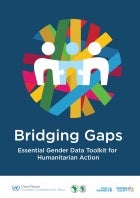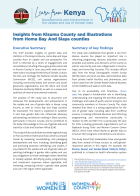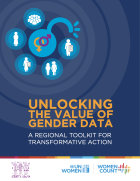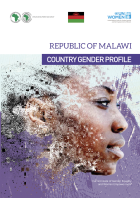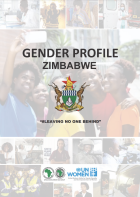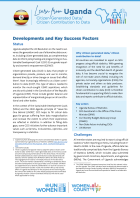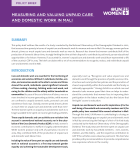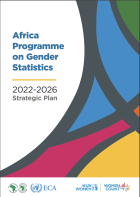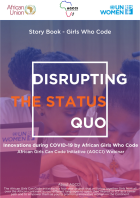1 - 20 of 20 Results
Date:
This toolkit is aimed at providing an easily accessible compendium of resources available for the production and use of gender data in humanitarian settings. It is tailored to build capacity and provide guidance to governments, civil society organizations (CSO), humanitarians working with data, information managers, managers, decision makers, statisticians, and users of gender statistics. The contained tools can be used in support of key humanitarian planning and operational processes, including advocacy, strategy and policy formulation, planning, resource allocation, monitoring, and evaluation.
Date:
Kenya has demonstrated thought leadership in the use of administrative and citizen data for statistical purposes and harnessing official data to meet national priorities and SDG targets including on gender equality and women’s empowerment. This product highlights tangible achievements and lessons in improving access to and use of this data to influence policy and decision-making and improve the lives of women and girls in Kenya.
Date:
This Toolkit is designed to support the enhanced use of existing gender data and statistics in policy, advocacy, planning, and accountability in East and Southern Africa. The production and use of gender statistics is a complex process that requires deliberate efforts to connect, incentivize, and influence.The strategies outlined provide guidance and user-friendly tips on how to influence, direct, and monitor the pace of progress towards achieving gender equality and women’s economic empowerment and using gender data and statistics.
Date:
This product is related to the Be Like Tanzania series and part of an ongoing regional study. The study aims to showcase developments, achievements and lessons in the uptake and use of gender data and statistics in East and Southern Africa as part of experience-sharing and particularly south-south learning towards promoting the communication and use of gender data and statistics for policy- and decision-making to improve the lives of women and girls.
Date:
This Report presents the Africa Shared Research Agenda (ASRA) for ending gender-based violence (GBV), which was developed though a collaboration between UN Women Africa and the Sexual Violence Research Initiative. The ASRA is a set of research priorities for the field, developed through a participatory and consultative process and aims to inform investments in research over the coming 5-10 years for ending GBV in Central, East, Southern and West Africa.
Date:
The Malawi Counrty Gender Profile publication presents a review of existing gender issues identified through a review of documents and reports recently released. The generic purpose of Country Gender Profile is to strengthen national understanding and data on the advancement of international, regional and national commitments towards Gender Equality and Women's Empowerment.
Date:
This Policy Brief will explore the results of the mapping of the women’s movement, and the weaknesses, strengths and recommendations of the current civil-society movement as identified during the National Forum and analysis of the mapping.
Date:
This publication discusses Zimbabwe's progress with regard to gender equality and the empowerment of women in the different spheres. The profile also provides concrete recommendations and strategies in accelerating the advancement of gender equality and the social and economic empowerment of women. Also, it provides recommendations and guidance to promote gender sensitivity of future programming and projects.
Date:
Uganda's the national statistical system (NSS) has sought to respond effectively to the surge in demand for gender data by using existing legal infrastructure, coordination mechanisms, and statistical and data development strategies to increase the available data. One of these steps is the development of citizen-generated data (CGD)−now more accurately referred to as citizen contribution to data (CCD). Several achievements and lessons from this move are highlighted in this brief.
Date:
This policy brief outlines the results of a study conducted by the National Observatory of the Demographic Dividend in 2022, that assesses time poverty in terms of unpaid care and domestic work in Mali. Research showed that women contribute 80% of the
production of domestic labour time, strongly limiting the time at their disposal for paid work and educational opportunities. If accounted for, women’s unpaid care would represent 17.6% of the country’s GDP (2019).
Date:
Drawing on an assessment of the needs of rural women in Senegal, Mali, Liberia, Malawi and Haiti, and on an ecosystem mapping and market dialogue process, these infographics illustrate the challenges that rural women face to access resilience-building services that are tailored to their needs, and provide insights into gender-responsive policy measures and innovative solutions to respond to the women’s needs and build their resilience to climate change and disasters.
Date:
Gender responsive approaches in Climate Smart Agriculture.
Date:
Lack of adequate data to inform and monitor policies and progress undermines efforts to move forward Africa's gender agenda. The production of gender statistics in the region has been slow due to a combination of factors discussed in this Plan. However, increased interest in gender statistics and the current conducive policy environment for the their integration into statistical databases provide valuable opportunities to further strengthen statistical systems in Africa.
Date:
Innovations during COVID-19 by African Girls Who Code
Date:
This brief gives an overview of the Gender Statistics programmes across East and Southern Africa.
Date:
The study identifies a number of challenges including inadequate normative frameworks and infrastructure to support statistical production, large time gaps between household surveys and censuses, limited dissemination and use of gender data and statistics across the NSS, and weak administrative data quality and systems in Malawi.
Date:
This assessment identifies gaps in Sudan’s gender statistics system with findings related to the country’s related frameworks, strategies, production, analysis, and use of gender data and statistics. The findings are expected to provide the basis for the implementation of Making Every Woman and Girl Count (Women Count), UN Women’s flagship gender data and statistics programme in Sudan.
Date:
The study identifies a number of challenges including inadequate normative frameworks and infrastructure to support statistical production, large time gaps between household surveys and censuses, limited dissemination and use of gender data and statistics across the NSS, and weak administrative data quality and systems in Mozambique.
Date:
Booklet that guides the production, analysis and communication of gender statistics among data producers and users. and promote the use of gender statistics for informed decision-making and policy development.
Date:
The gaps identified in this needs assessment report relate to the interrelated areas of: enabling policy environment, data production, accessibility and use for strengthening the gender statistical system in the United Republic of Tanzania. This assessment is extremely relevant to the period when the country is implementing the 2030 global agenda its respective national plans.

